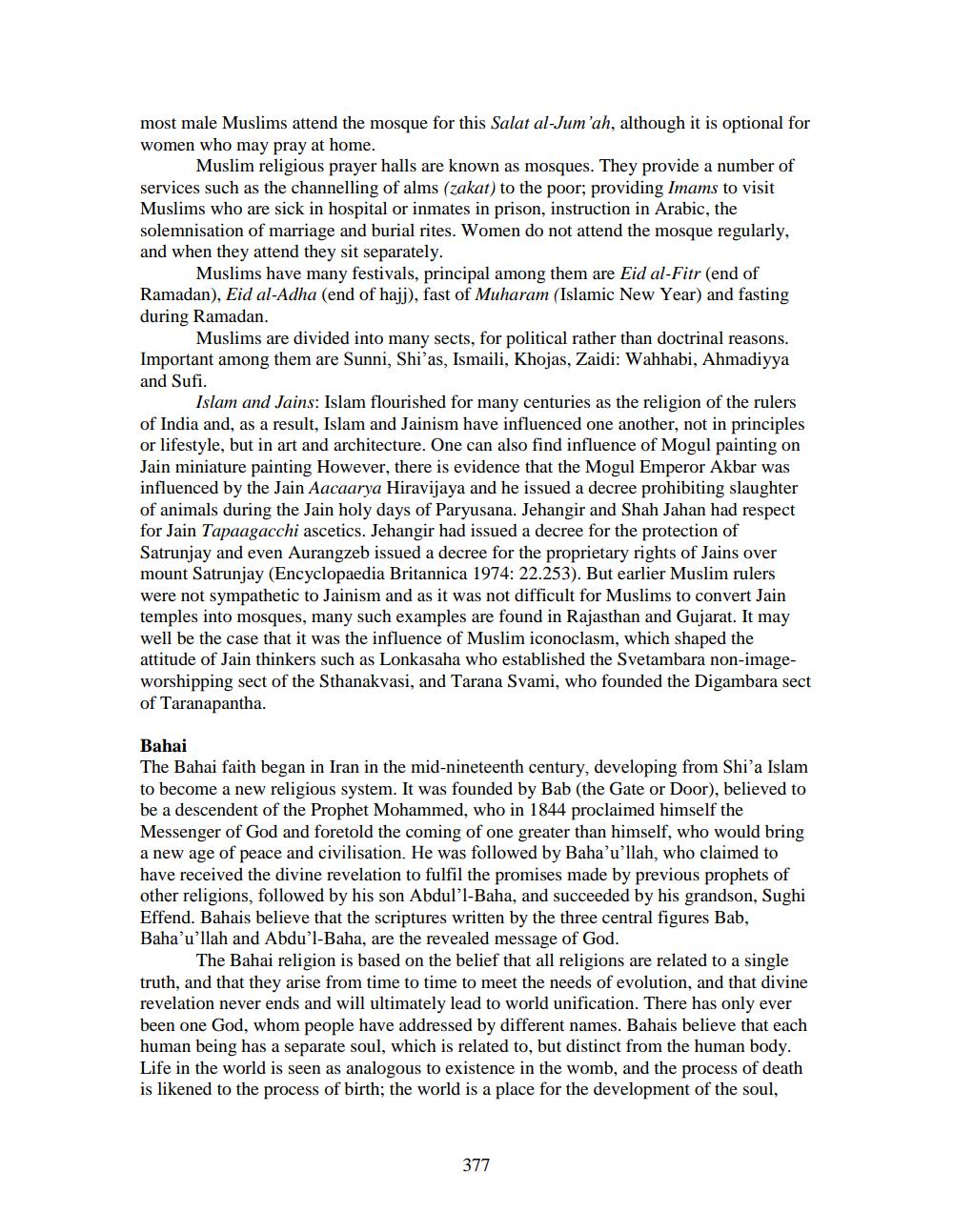________________
most male Muslims attend the mosque for this Salat al-Jum'ah, although it is optional for women who may pray at home.
Muslim religious prayer halls are known as mosques. They provide a number of services such as the channelling of alms (zakat) to the poor; providing Imams to visit Muslims who are sick in hospital or inmates in prison, instruction in Arabic, the solemnisation of marriage and burial rites. Women do not attend the mosque regularly, and when they attend they sit separately.
Muslims have many festivals, principal among them are Eid al-Fitr (end of Ramadan), Eid al-Adha (end of hajj), fast of Muharam (Islamic New Year) and fasting during Ramadan.
Muslims are divided into many sects, for political rather than doctrinal reasons. Important among them are Sunni, Shi'as, Ismaili, Khojas, Zaidi: Wahhabi, Ahmadiyya and Sufi.
Islam and Jains: Islam flourished for many centuries as the religion of the rulers of India and, as a result, Islam and Jainism have influenced one another, not in principles or lifestyle, but in art and architecture. One can also find influence of Mogul painting on Jain miniature painting However, there is evidence that the Mogul Emperor Akbar was influenced by the Jain Aacaarya Hiravijaya and he issued a decree prohibiting slaughter of animals during the Jain holy days of Paryusana. Jehangir and Shah Jahan had respect for Jain Tapaagacchi ascetics. Jehangir had issued a decree for the protection of Satrunjay and even Aurangzeb issued a decree for the proprietary rights of Jains over mount Satrunjay (Encyclopaedia Britannica 1974: 22.253). But earlier Muslim rulers were not sympathetic to Jainism and as it was not difficult for Muslims to convert Jain temples into mosques, many such examples are found in Rajasthan and Gujarat. It may well be the case that it was the influence of Muslim iconoclasm, which shaped the attitude of Jain thinkers such as Lonkasaha who established the Svetambara non-imageworshipping sect of the Sthanakvasi, and Tarana Svami, who founded the Digambara sect of Taranapantha.
Bahai The Bahai faith began in Iran in the mid-nineteenth century, developing from Shi'a Islam to become a new religious system. It was founded by Bab (the Gate or Door), believed to be a descendent of the Prophet Mohammed, who in 1844 proclaimed himself the Messenger of God and foretold the coming of one greater than himself, who would bring a new age of peace and civilisation. He was followed by Baha'u'llah, who claimed to have received the divine revelation to fulfil the promises made by previous prophets of other religions, followed by his son Abdul'l-Baha, and succeeded by his grandson, Sughi Effend. Bahais believe that the scriptures written by the three central figures Bab, Baha'u'llah and Abdu'l-Baha, are the revealed message of God.
The Bahai religion is based on the belief that all religions are related to a single truth, and that they arise from time to time to meet the needs of evolution, and that divine revelation never ends and will ultimately lead to world unification. There has only ever been one God, whom people have addressed by different names. Bahais believe that each human being has a separate soul, which is related to, but distinct from the human body. Life in the world is seen as analogous to existence in the womb, and the process of death is likened to the process of birth; the world is a place for the development of the soul,
377




